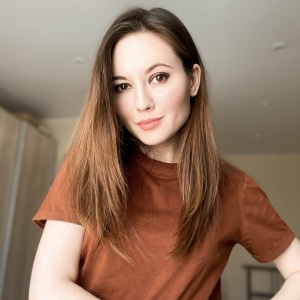Tell us a bit about yourself – what stage of your PhD are you in and what’s your project about?
Currently, I am at the beginning of the third year (out of four) of my PhD program. I study the mechanisms of acute myeloid leukemia cells resistance to targeted therapy within my main projects. Acute myeloid leukemia is a highly heterogeneous disease with poor prognosis for elder patients and limited therapy options. Relapses are one of the main problem in acute myeloid leukemia treatment. Myeloid cells develop in bone marrow niche that produce cytokines and growth factors. It’s known that leukemia development can be supported by those cytokines and growths factors. I try to reveal what particular cytokines are implicated in the resistance of acute myeloid cells with kinase mutations to targeted therapy. I hope that my findings could be helpful in the development of effective treatment strategies. I also have several projects that are devoted to: histone deacetylases, myeloid transcription factors, proteasomes.
What does a typical day or week look like for you?
I mostly work with cell cultures: i treat them with drugs, count, measure apoptosis, stain with antibodies, transfect them with plasmids and make lentiviral transduction to get new cell lines with hyperexpression of leukemia specific genes, extract RNA and proteins and perform qPCR and western blots. I do experiments on 6-7 cell lines at a time. Also, I teach and supervise bachelor students. Aside from research work, I control the consumables in the lab and order them from companies. I often write research proposals and reports. During a year I also give seminars and lectures on Molecular Biology.
What’s one thing that you’ve enjoyed the most during your PhD?
Defense of my first bachelor student 2 years ago. I was supervising her research during the year. She was participating in a project for which I’ve got my first ever research grant for young scientists (RFBR funding). I was very pleased to see her first steps in science and defense with honors. She left the lab to study data analysis but we are still in contact.
What’s been the most challenging part of it?
Writing my first research paper in a month at the end of the first year of my PhD (I’ve already had a review paper at the moment). Me and a colleague decided to publish our interesting but controversial findings in Molecular Biology (IF=0.9), then we decided to perform a couple of additional experiments and also learn how to analyze transcriptomic data of patients. We developed several methods and one month later we decided to send the paper to Frontiers in Oncology (IF=4.8). We finished writing the paper within 3 weeks making experiments in parallel working 14 hours a day. And it was published just a day before my birthday!
Where do you see yourself 5 years after completing your PhD?
I hope to find myself being an assistant professor at NIH, DKFZ or Broad Institute.
What’s one piece of advice that you’d offer students that are thinking of doing a PhD?
Read a lot of scientific papers. Learn statistics. Select a lab with working hard post-docs and science loving PhD students.
What makes your university a good place to study?
My alma-mater gives students a unique opportunity to get deep knowledge in mathematics and physics (including theoretical physics) and biology. We have not many biological practical courses during bachelor, but our education plan includes research practice in laboratory during the forth year of bachelor (3 days a week), that gives an opportunity to built a scientific career from young age.
What do you enjoy doing in your free time?
I am science communicator and an EACR Ambassador. I want to help more young scientists and students to find their place in scientific world, to share with them opportunities like research grants, meeting bursaries, conferences and lab life-hacks. Unfortunately, in Russia young researchers poorly communicate with each other and with international research communities. So, for example, they visit international conferences very rarely. Also, a lot of people don’t read scientific papers and do not stay up to date with current research. Therefore, I decided to start a Journal Club for young scientists at my Institute this year.
Want to know more about Elmira?
Follow her on Instagram using the link below:
Instagram







